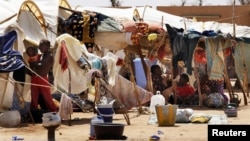GENEVA —
The United Nations refugee agency (UNHCR)says there are almost twice as many people displaced inside Mali than previously thought. The agency says new data finds nearly 204,000 people are currently displaced rather than the previous estimate of close to 119,000.
The UNHCR says in part, the revised figure reflects better access to areas in northern Mali by the Commission on Population Movement in Mali. The commission is a group working under UNHCR supervision.
The UNHCR adds that improved counting of IDPs in the capital, Bamako, also has been instrumental in raising the numbers. It notes 46,000 displaced people were found there in September, up from 12,000 counted last June and July.
UNHCR spokesman Adrian Edwards says even the higher revised figures probably underestimate the true number of displaced in this troubled West African country.
"There have also been indications of actual new displacement," said Edwards. "We have reports of people fleeing general insecurity and a deteriorating human rights situation in the north. There is fear of imminent military activity. People are also reporting loss of livelihoods and limited access to basic services."
Last March, Mali's elected government was overthrown by a military coup. This paved the way for Tuareg rebels, who had been waging a long war for independence, to seize the north. However, shortly after, the Tuaregs were ousted from power by radical Islamist groups, including al-Qaida in the Islamic Maghreb.
These groups have imposed a harsh form of Shariah law, enforced by beatings, amputations and stonings, prompting hundreds of thousands of northerners to flee their homes.
An international consensus is emerging that military action may be necessary to push the radical Islamists out of the north.
About one-quarter of a million Malians have fled as refugees to neighboring countries and thousands of new refugees are continuing to arrive in Niger, Burkina Faso and Mauritania.
UNHCR spokesman Edwards says the security situation in the region is very fluid. He says access to the refugees in the three countries is becoming ever more difficult because of threats to aid workers and UNHCR staff there.
"The risk of abductions of aid workers means that our teams have to travel with armed escorts," added Edwards. "Frequent security alerts are limiting access to the camps and our ability to assist. In Burkina Faso, we have started voluntary relocation of Malian refugees from Ferrerio camp and Deou Tamachek in the northern province of Oudalan, to a safer and improved site further south. Security is also a concern in Niger."
Edwards says schools for refugee children in Niger have not yet started in the camps because the schools are still being built. He adds that UNHCR fears children and adolescents who do not go to school may return to Mali where they risk being recruited by various armed groups.
The UNHCR says in part, the revised figure reflects better access to areas in northern Mali by the Commission on Population Movement in Mali. The commission is a group working under UNHCR supervision.
The UNHCR adds that improved counting of IDPs in the capital, Bamako, also has been instrumental in raising the numbers. It notes 46,000 displaced people were found there in September, up from 12,000 counted last June and July.
UNHCR spokesman Adrian Edwards says even the higher revised figures probably underestimate the true number of displaced in this troubled West African country.
"There have also been indications of actual new displacement," said Edwards. "We have reports of people fleeing general insecurity and a deteriorating human rights situation in the north. There is fear of imminent military activity. People are also reporting loss of livelihoods and limited access to basic services."
Last March, Mali's elected government was overthrown by a military coup. This paved the way for Tuareg rebels, who had been waging a long war for independence, to seize the north. However, shortly after, the Tuaregs were ousted from power by radical Islamist groups, including al-Qaida in the Islamic Maghreb.
These groups have imposed a harsh form of Shariah law, enforced by beatings, amputations and stonings, prompting hundreds of thousands of northerners to flee their homes.
An international consensus is emerging that military action may be necessary to push the radical Islamists out of the north.
About one-quarter of a million Malians have fled as refugees to neighboring countries and thousands of new refugees are continuing to arrive in Niger, Burkina Faso and Mauritania.
UNHCR spokesman Edwards says the security situation in the region is very fluid. He says access to the refugees in the three countries is becoming ever more difficult because of threats to aid workers and UNHCR staff there.
"The risk of abductions of aid workers means that our teams have to travel with armed escorts," added Edwards. "Frequent security alerts are limiting access to the camps and our ability to assist. In Burkina Faso, we have started voluntary relocation of Malian refugees from Ferrerio camp and Deou Tamachek in the northern province of Oudalan, to a safer and improved site further south. Security is also a concern in Niger."
Edwards says schools for refugee children in Niger have not yet started in the camps because the schools are still being built. He adds that UNHCR fears children and adolescents who do not go to school may return to Mali where they risk being recruited by various armed groups.





